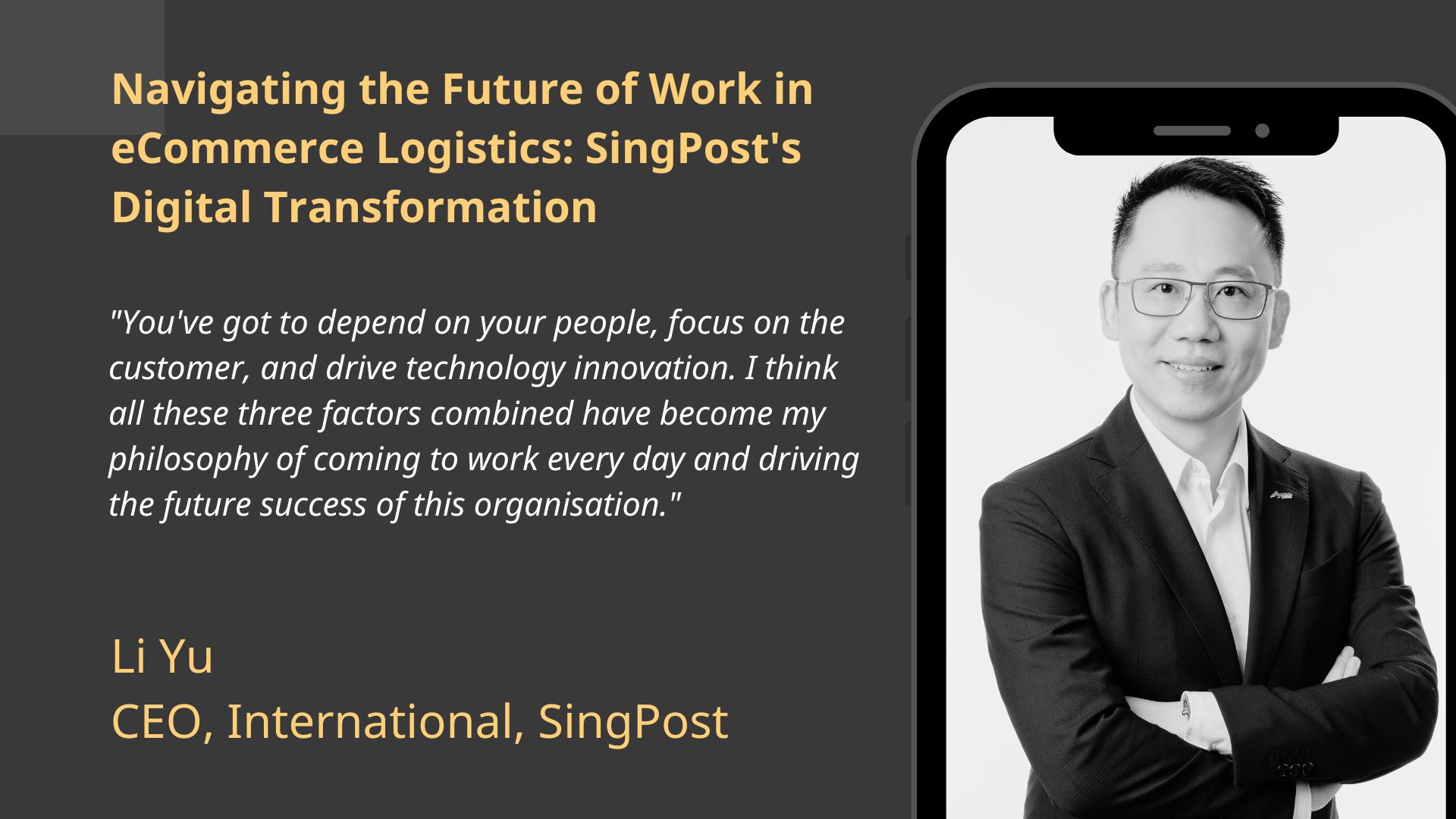
Navigating the Future of Work in eCommerce Logistics: SingPost's Digital Transformation
This article is part of a series of interviews with SingPost senior leaders on the 'Future of Work' - an initiative within the Group designed to support its transformation into a technology-driven logistics enterprise. The 'Future of Work' initiative comprises a focus on employee upskilling through its Future of Work Academy, digital and automation Centres of Excellence (CoEs) and, through a partnership with Google, an Innovation Lab. This series captures the views and vision of business leaders driving change through the organisation.
Singapore - In the rapidly evolving landscape of global eCommerce, SingPost's International Business Unit is embarking on a transformative journey. We spoke with Li Yu, CEO of International, on how the business unit is leveraging its "Future of Work" initiative to redefine eCommerce logistics operations in the digital age.
The Digital 4PL Model: Tailored for eCommerce
SingPost’s International business unit operates as a third party logistics provider (3PL) and is also shaping up to be a specialised 4PL (Fourth-Party Logistics) digital solution provider, focusing specifically on the booming eCommerce logistics industry. This model allows for orchestrating complex logistics solutions without the burden of extensive physical assets.
Li Yu explains the division's unique positioning: "We don't own any planes. We have a network of dots. The important thing is when you procure space from the airlines, from the freighters, from freight forwarders and/or charters, you try to understand with a short-term view, month-by-month capacity planning."
"This asset-light model allows us to be highly flexible and responsive to market dynamics. Instead of being constrained by owned assets, we leverage our network of strategic partnerships to dynamically adjust our capacity and routes based on real-time market conditions and customer needs. We can quickly procure spot rates and tee up the required services, which allows us to offer competitive pricing and respond rapidly to changes in demand," he shared.
This agile approach is particularly suited for the dynamic eCommerce sector. According to recent statistics, global eCommerce sales are projected to reach $6.3 trillion by 20241. International BU’s focus on this sector positions it at the forefront of a significant market opportunity.
Targeting the eCommerce Sweet Spot
Li Yu emphasises the International Business Unit's strategic focus on eCommerce shipments: "Our sweet spot is shipments ranging from zero to 5 kg. You don't want to use us for 30 kg, big gigantic furniture type of stuff. That's not our sweet spot." Li Yu elaborates on their target market: "Segment wise, I will say that if you look at SMEs and enterprises, we're probably talking about retail consumer products like fashion. But if you look at the platforms today, it's mainly eCommerce. So it could be anything." The unit's strategy extends to key eCommerce lanes: "We're looking at four main lanes: US-Canada, Hong Kong-Singapore, Australia, and ASEAN countries. This includes both inbound and outbound flows."
The unique proposition for the International Business Unit is the ability to provide both commercial and postal solutions to customers - enabling eCommerce in areas where third party commercial partners are limited. "We offer a distinct advantage in enabling eCommerce for remote and underserved markets. By providing both commercial and postal solutions, we bridge the gap where traditional third-party commercial partners are limited. This dual approach allows us to facilitate seamless online trade to even remote/far-flung places like the Faroe Islands, Guam and the Maldives, providing a more economical alternative to more isolated islands where cost of logistics runs high."
Embracing the Future of Work
For Li Yu, the Future of Work transcends mere technological adoption. It's about empowering people and meeting evolving customer needs in the fast-paced eCommerce environment. He articulates his vision: "The most important thing is to create a global standard for the organisation to embrace the competition and meet customer needs. More importantly, we strive for people to thrive. The Future of Work means a new way of getting things done, taking care of the customers and more importantly, making sure our people are empowered."

A Comprehensive Transformation Strategy
The Future of Work initiative at SingPost integrates several key elements:
1. Future of Work Academy: Focused on upskilling employees to effectively utilise digital tools and platforms essential for eCommerce logistics.
2. Centres of Excellence: Promoting Centers of Excellence for Automation and Analytics encourage the rapid adoption and realisation of digitisation projects across the Group.
3. Google Innovation Lab: Leveraging the benefits of partnership with Google, and adoption of Google Workspace and hardware for enhanced security, collaboration and automation possibilities.
Li Yu emphasises the importance of integration: "All the processes have to be integrated. This integration is a key opportunity for us to create a more cohesive and efficient operation." This holistic approach aims to leverage the collective knowledge across the organisation, breaking down silos and transforming localised knowledge into standardised, accessible processes.
Balancing Innovation and Operational Stability
A key challenge in any digital transformation is maintaining operational stability while driving innovation. SingPost's approach involves digitalising and standardising processes, reducing reliance on localised knowledge, and creating more robust, scalable operations. As Li Yu notes, "We need to take a leap forward by bridging the gap, leveraging the technology to come up with a digital process to replace the old and to even fill in the gap of something that we have never had before."
Empowering Employees While Mitigating Human Error
A nuanced approach to human involvement in decision-making processes is central to Li Yu's strategy, especially important in the error-sensitive world of eCommerce logistics: "If you want people to make a decision that creates an issue-free or zero defect type of situation, it's almost impossible. So, where possible, I would rather have the decision making to be process and system driven and eliminate some of the tedious repetitive types of human errors."
Li Yu summarises his philosophy: "You've got to depend on your people, focus on the customer, and drive technology innovation. I think all these three factors combined have become my philosophy of coming to work every day and driving the future success of this organisation."
Looking Ahead
As global eCommerce sales are projected to grow close to 9% in 2024 and reach $6.3 trillion by 20242, SingPost's digital transformation positions it to capture a significant share of this growing market. The company's journey offers valuable lessons for organisations across industries grappling with digital disruption and the future of work.
As SingPost continues to evolve, its experience will provide ongoing insights into the challenges and opportunities of digital transformation in traditional industries.
---
¹ https://www.shopify.com/sg/blog/global-ecommerce-sales
² https://www.shopify.com/blog/global-ecommerce-sales











